I suspect, quite a bit.
While I’ve worked in a number of different industries in the Performance Management discipline, I must admit that I’m relatively new to this whole Social Media thing. One of the things that quickly became very clear to me is that the vast majority of posts- be it on twitter, blog sites, or discussion boards that focus on the subject of Performance Management, Measurement, or BI (Business Intelligence) in general, tends to be geared to those disciplines as they relate to Social Media.
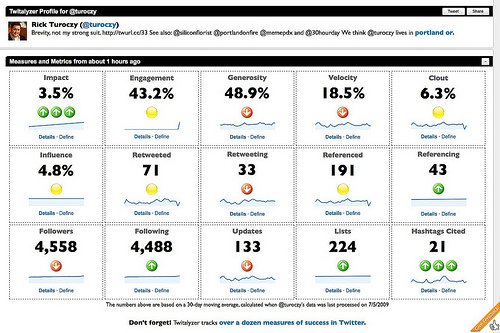
Now, either this is an industry where the “management of performance” is at a level so disproportionately higher than any other in today’s society (which I find doubtful given the state of Business Performance in general), or it is simply one where the majority of developers and advocates of BI solutions happen to find themselves playing in today. Or it is because the users of social media have found it so useful in their marketing, sales, and CRM processes, that playing in this space is of such paramount importance to their competitive success. Or perhaps it is simply because social media, by its very nature, is quite an addictive “sport”, behaviorally driving them to expand their network and crave the “daily fix” of data that tells them how they are doing.
Quite frankly I don’t really care which it is, and neither should you. Most likely, it’s a combination of all of the above. But regardless of what is driving this passion for performance information, the manner in which performance is being proactively managed in this space is quite impressive, and carries with it some interesting dynamics worth noting and taking back into our businesses where performance improvement REALLY MATTERS!
Here are a few of my observations on why it works so well in social media space:
- Data Visualization– from both a creative and simplicity standpoint. Just a quick scouring of the internet yields hundreds of websites that offer a variety of visualization tools that offer easy to read/ easy to interpret metrics that can tell you how you are doing in a single snapshot. I’ve worked with organizations that spend thousands, if not millions of dollars installing performance dashboards that quitefrankly don’t hold a candle to the style and simplicity of some of these tools. And while I don’t underestimate the nature and complexity of some of these “corporate projects” (data gathering, conditioning, integration, report generation, cultural dynamics, etc.), the fact is that many of them have missed the importance of the visualization part altogether. In my 20+ years of working in the field of Performance Management, the most important thing I’ve learned is that the ability to communicate messages and results is the MOST VITAL part of making the system work, and data visualization is the key to that. Social Media analytics have made significant advances in this regard, and offer many good ideas that we should all start looking at to improve our BPM processes.
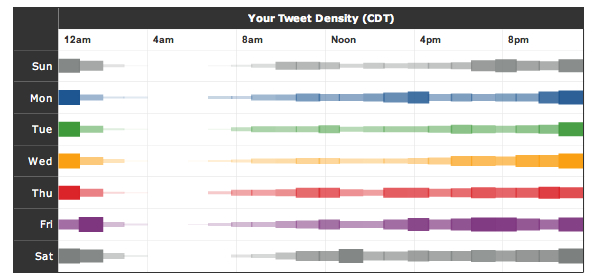
- Ease of access, and ease of use– Simply stated, the performance analytics in this space are cheap and easy. Notice I don’t say cheap and dirty, because they’re not. No matter what tool you end up using in this arena, they are all usually one click away. They don’t require big downloads, layers of security, or complex set up. Even those that require a subscription cost only a few bucks a month. Now I’m not suggesting you can set up a corporate wide EPM reporting system for 100 bucks a month (although a small business probably could !), I am saying that we can certainly take a page out of their playbook. Fact is, the part where our effort and resources should be strongest is in selecting the right metrics, setting the right targets, and shaping the culture to fully leverage the information at hand- NOT in creating (or in some cases REINVENTING) new applications, when there are those that might be able to simply “plug and play” with our existing process and data. Now before I get an earful from the myriad of software vendors out there who think I am way over simplifying this, I would ask a few simple questions. Why is it that companiesstill try to manage data using their antiquated excel and access tools and data models? Why is it that companies who do invest millions in “big time” BI systems and solutions still struggle so much in getting users to actually USE their reports in the day to day management of the business. More often than not simple is better.
- Focus on the result desired– How many of you would admit to actually “getting lost in the data” from time to time? I’m betting quite a few. I cant tell you how many times I see organizations tracking dozens of performance stats, but give me blank stares when I ask them what their
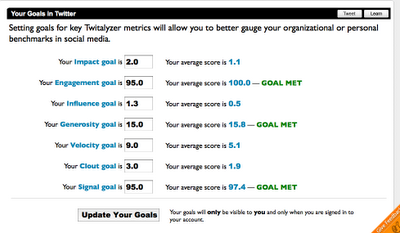 desired performance outcomes are, or what their targets should be for the coming years. Yet many of the tools in Social Media space seem to start at the beginning with those very questions, as they should. Many of these tools, begin by explaining WHY certain metrics matter. They proceed to tell you HOW these metrics impact each other. And the good ones take your right into the space of actually setting your targets, with some even providing useful benchmarks that align directly with your desired outcomes.
desired performance outcomes are, or what their targets should be for the coming years. Yet many of the tools in Social Media space seem to start at the beginning with those very questions, as they should. Many of these tools, begin by explaining WHY certain metrics matter. They proceed to tell you HOW these metrics impact each other. And the good ones take your right into the space of actually setting your targets, with some even providing useful benchmarks that align directly with your desired outcomes. - The gaming mindset– whether you call this “gamification” (a term that is used in the industry to describe how effective companies harness consumers’ inherent desire to “participate in a game”- be it the collection of “badges” on face-book games, to the age old loyalty programs of the airlines and hotels), or simply recognize it for what it is- practices than encourage simple behavior modification (remember Skinner’s pigeons?). The fact is that most human beings resonate with this. If we can accept the fact that this behavior pattern exists, then we can also begin to ask ourselves how it can work inside our businesses. People wake up day in and day out to check their Facebook counts, twitter stats or online game rankings. We should be able to build that same dynamic into wanting to see the same kind of “performance updates” in the workplace. I submit that there are two reasons why this hasn’t occurred (beyond the fact that people care about themselves more than they do the workplace). First, we haven’t kept it simple enough (its hard to get interested in 100 metrics or metrics we don’t understand). And second, we as managers haven’t made it something they should care about. Once you’ve captured their interest, the driving desire to understand and analyze “why” will soon follow.
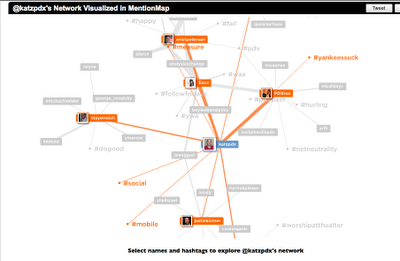
- They understand COMMUNITY, and where they live- Often literally. Human beings, whether at home or on the job tend to harness the power of those around them to increase their enjoyment, quality of life and need for interaction. Social media by its definition has tapped into that and really made it a thriving business. But what does this mean in the workplace? Our IT systems in business tend to be used only for quantitative data and analysis. But what if we could mine that data so that we can understand what our employees and managers really CARE ABOUT. Where is the dialogue focused? What do they talk about and care about? When do they talk? What trends are they worried about? Perhaps this may sound a bit far fetched for the business community, but I am of the believe that there is a world of data out there that we could really harness in getting metrics and performance issues on the radar screens of our stakeholders, and in the right context.
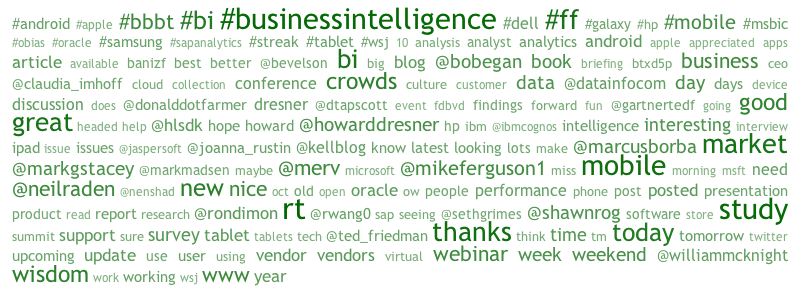
Twitter Analytics- A typical "tweet cloud" showing density of discussion topics and interests based on past cloud interaction
* * * * * * * * * * * * * * * * * *
There are probably a myriad of reasons that I haven’t named here, and certainly I invite you to add to my list. But these strike me as a good starting point in understanding how we can begin to translate these ideas back to the business setting so that we can better leverage the investments we continue to make in our own performance improvement efforts.
Author: Bob Champagne is Managing Partner of onVector Consulting Group, a privately held international management consulting organization specializing in the design and deployment of Performance Management tools, systems, and solutions. Bob has over 25 years of Performance Management experience and has consulted with hundreds of companies across numerous industries and geographies. Bob can be contacted at bob.champagne@onvectorconsulting.com
